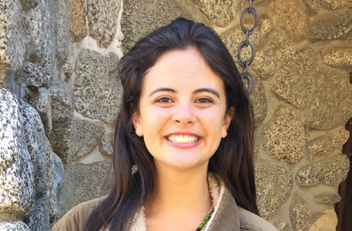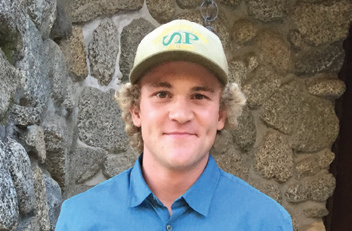Summer at Swanton Pacific Ranch
Cal Poly’s Swanton Pacific Ranch in Davenport, California, is a premier outdoor learning center, providing unique opportunities for cross-curricular education and research. Students and faculty come from departments and colleges across Cal Poly’s campus to explore, cultivate and protect the majestic redwood forests, lush riparian ecosystems, and expansive coastal grasslands that comprise the living laboratory.
Swanton hosted 15 internships this past summer and more than 35 students participated in residential field classes and research.
 Madison Gilmartin, a senior majoring in environmental management and protection, worked as a forestry intern this summer, and her project, “2018 Mortality Assessment Analysis,” involved field testing and calibrating a tree mortality model developed in 2010-13 as a tool for forest managers.
Madison Gilmartin, a senior majoring in environmental management and protection, worked as a forestry intern this summer, and her project, “2018 Mortality Assessment Analysis,” involved field testing and calibrating a tree mortality model developed in 2010-13 as a tool for forest managers.
Gilmartin’s field site was the area burned by the 2009 Lockheed Fire, and she derived data from 82 unique plots and more than 3,000 trees. Swanton Pacific Ranch gave Gilmartin the opportunity to combine science and policy. She learned how to collect and analyze field data, apply them in a model and inform management of forest resources in a sustainable way.
Some of her challenges included working under harsh field conditions — heat, poison oak, wasps, rattlesnakes, rough terrain — on a daily basis. In addition to the physical demands, she was pushed intellectually to analyze a large data set and translate it into meaningful policy suggestions.
“My internship at Swanton reinforced my desire to pursue forestry as a career after Cal Poly, either as a research scientist or field forester.”
 Mackenzie Zeimet, a senior majoring in agricultural business, joined the livestock and rangeland management internship at Swanton to learn more about cattle and marketing grass-fed beef. Growing up in Bakersfield, California, Zeimet had previous experience raising hogs and working as an agricultural extension agent to the almond and grape industries.
Mackenzie Zeimet, a senior majoring in agricultural business, joined the livestock and rangeland management internship at Swanton to learn more about cattle and marketing grass-fed beef. Growing up in Bakersfield, California, Zeimet had previous experience raising hogs and working as an agricultural extension agent to the almond and grape industries.
Zeimet’s daily routine revolved around feeding animals, checking on cows and herding them to pasture, fence work, and repairing water lines. Outside of these tasks, she completed the research project “Rangeland Soil’s Untold Story,” which involved collecting and testing rangeland soils for texture and infiltration. The long-term goal of her project was to create a database that can track how Swanton’s rangeland management practices impact soils over time. Her primary challenge was to learn how to balance her animal husbandry chores with her research. In the process, she honed her observational skills, learned to analyze problems and develop solutions, and discovered that livestock operations is not all about the cattle, it’s also about the soils and grasses.
“My experience working on the rangelands this summer made me realize that I want to be more involved in animal husbandry and sustainable land-use management, a shift in focus that I am excited about.”
 Growing up in redwood country, Kylen Maple was no stranger to the magnificent coastal redwood forests of Swanton Pacific Ranch. As a senior majoring in soil science, Maple’s summer internship experience was in the Crops Management program, where he worked and studied on an organic farm. His project, “Water Quality Monitoring Plan for Efficacy in Organic Agriculture,” sought to quantify the nutrient load leaving the organic farm and entering Scotts Creek, one of the southern-most tributaries for Coho salmon in North America. Maple’s research measured nitrate, nitrite, ammonia and phosphorus discharges, and considered how various agricultural land-use practices impacted discharge quantities and constituents.
Growing up in redwood country, Kylen Maple was no stranger to the magnificent coastal redwood forests of Swanton Pacific Ranch. As a senior majoring in soil science, Maple’s summer internship experience was in the Crops Management program, where he worked and studied on an organic farm. His project, “Water Quality Monitoring Plan for Efficacy in Organic Agriculture,” sought to quantify the nutrient load leaving the organic farm and entering Scotts Creek, one of the southern-most tributaries for Coho salmon in North America. Maple’s research measured nitrate, nitrite, ammonia and phosphorus discharges, and considered how various agricultural land-use practices impacted discharge quantities and constituents.
In addition, Maple worked in the Swanton apple orchard where he learned how to properly water, prune and propagate apples — all new skills to him. As a soil scientist, he was challenged to think about how crop management affected soils and water. Longer term, Maple hopes to pursue a career in groundwater management, focusing on research and development of remediation and management techniques.
“I didn't have much prior experience with crops, so I had to learn how to connect my experience in soils and watershed management to what was going on above ground — a new perspective for me.”
Visit the Cultivate Fall 2018 Page to read more stories.